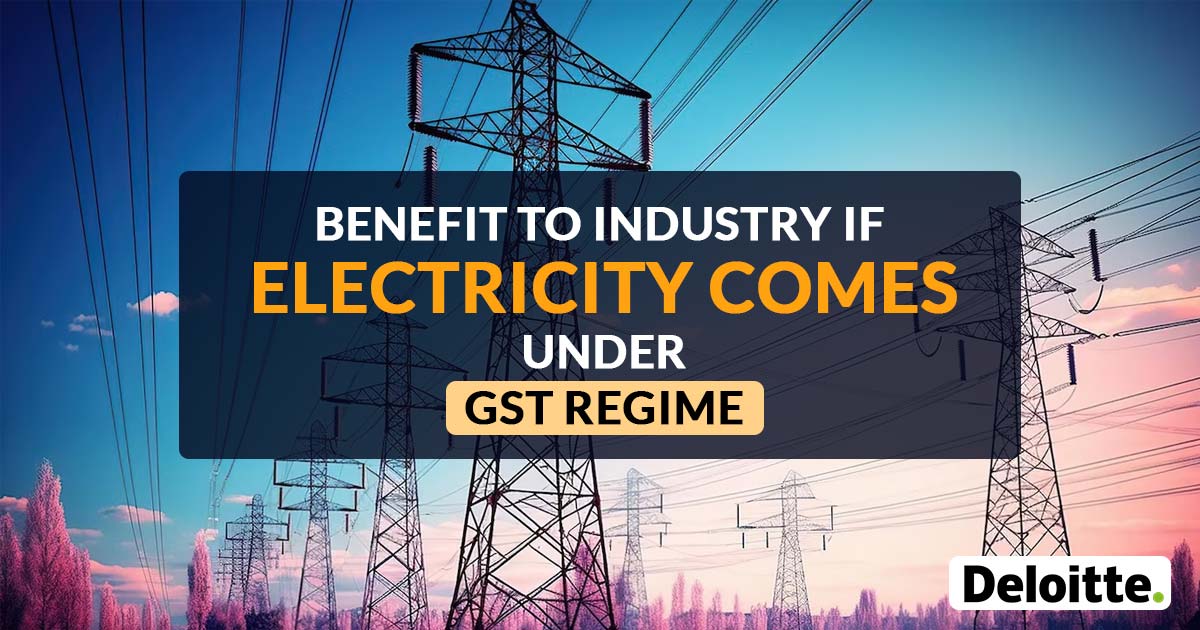
The government is exploring the inclusion of electricity within the goods and services tax (GST) framework. The Union Power Ministry is actively assessing its potential effects on various fronts such as industry, state revenues, and household electricity expenses. Historically, electricity, along with commodities like petrol, diesel, and natural gas, has existed outside the realm of GST.
Deloitte, a reputable audit and consulting firm tasked with analyzing this transition, presented a report to the power ministry. The findings indicate potential advantages for industries, projecting reduced levy expenses. In response, the ministry has initiated an inquiry into the anticipated impacts on state revenues and the electricity costs borne by residential consumers, according to sources familiar with the situation.
“One aspect we’ve gathered from industry feedback is that GST could potentially drive down electricity costs for businesses due to the possibility of claiming input tax credits. However, we’re yet to gauge the stance of states and domestic consumers, and the repercussions this shift might have on household budgets,” remarked one of the aforementioned individuals.
They further elaborated that during a meeting to gather state perspectives, most states voiced opposition due to concerns about potential revenue loss from electricity duties. “Each state has its own duty rates—some higher, some lower. The ministry aims to assess the broader landscape to understand which states might be impacted and to what extent,” the source continued. Additionally, they highlighted the need to comprehend the impact on the domestic sector, emphasizing its heightened political sensitivity, despite the potential benefits for the industry.
Important: Deloitte Survey 2023: Biz Want New GST Reforms & Relief
Issues sent to the Ministry of Power and Deloitte have been unanswered yet till press time.
Currently, power utilities include GST in the prices of electricity rather than collecting it separately from buyers. This results in an embedded tax within the electricity price, causing a cascading effect on the manufacturing sector.
The idea is that once electricity falls under GST, manufacturers can offset some of their tax liability by using the GST credit from their electricity expenses. This adjustment could enhance the sector’s competitiveness.
Regarding state involvement, discussions between the Centre and states explore the possibility of maintaining lower state electricity duties while integrating electricity into GST. This approach aims to address the revenue loss concern for states stemming from this reform.
According to the source familiar with these discussions, “By setting an appropriate GST rate on electricity, benefiting both the Centre and states and readjusting state electricity duties to a lower level, the overall impact could be revenue neutral for the states. Simultaneously, this move would offer the industry a more effective tax structure while safeguarding consumers from potential tariff hikes. It’s a step toward broadening the GST base and enhancing its efficiency.”
Another individual involved in the Center-state discussions suggested standardizing the state electricity duty at a uniform 0.5-1%, replacing the current varying rates between approximately 1% and 5% across states.
Once electricity falls under GST, coal-based thermal power plants are poised to gain significant advantages. They’ll be able to leverage tax credits from inputs and services to fulfil their final GST liabilities—a benefit currently unavailable due to the absence of GST on electricity. If, for instance, the GST rate on electricity is set at 5%, these coal-based plants could efficiently offset that liability with input tax credits, noted the same source requesting anonymity.
The anticipated beneficiaries of the GST expansion to include electricity primarily lean towards coal-based power ventures over cleaner energy and hydro projects. According to this source, “Including electricity in GST could serve as a pilot for extending GST to cover petrol, diesel, crude oil, natural gas, and jet fuel.”
Read Also: PB AAR: Electricity Transmission Lines Would Attract 18% GST on Shifting
The implementation of this move is projected to take a few years. In an interview during the Mint India Public Policy Summit on May 26, Sushil Kumar Modi, a Rajya Sabha member and former deputy chief minister of Bihar, mentioned that convincing states about the proposal to incorporate electricity into GST might take another five to 10 years.









